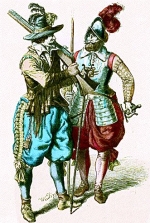|
The Swedish council of war went on well into the night. By now the Finnish colonels were each well into their second tankard of vodka and their contributions were limited to cries of "Hakkaa päälle!" Gustav Adolph[1], who had only been drinking beer, tried to continue his presentation.
He traced an outline of the Baltic coast by dipping his finger in a pool of spilt liquor on the oak table. "Cousin Siggy[2] is able to concentrate his forces where ever we march. His control of the Silesian coal fields gives him a train squadron second to none."
General Gustav Horn[3] agreed, "You're just getting ready to do a spot of advancing or pillaging and here's this enormous engine with carriages disgorging lancers."
The Chancellor, Axel Oxenstierna looked thoughtful. "Why do you fight the Poles your majesty?' he asked provocatively.
"Well, as you know Axel," the King explained in tones one might use on an American native, unfamiliar with the Europe of the XVIIth century, "Sigismund III of Poland was once Sigismund I of Sweden as well. He still refuses to recognize my late Father's lawful usurpation of the Swedish throne and needs to be jolly well taught a lesson. Besides, he's one of those beastly Catholics. No true Swede would accept one such as he as their ruler."
"Majesty, what you say is true," Oxenstierna agreed. "But as Chancellor I must warn you that your treasury is not inexhaustible. It is not as if you have the wealth of Denmark."
Gustav Adolph looked thoughtful. "The Danes, eh? Why do they have all the money?"
It was the Chancellor's turn to be supercilious but, as a good subject, in an obsequious kind of way. "As you know, your majesty, Christian IV controls Elsinore. The Sound Tolls that the Danes impose on all shipping entering or leaving the Baltic sea amount to some 200,000 thalers a year. King Christian has used this money to build up quite a substantial war chest."
"What are you saying, Axel?" the King demanded.
"What I am saying, your majesty, is that despite your brilliance as a commander and the bravery of your captains, you are beating your head against the figurative brick wall that is Poland. Sweden as it stands cannot decisively beat the Poles at the present. A richer Sweden could do so in the future."
"But Oxenstierna. If I can't defeat Poland, how can I defeat richer Denmark?"
"You are right, majesty. You can't. Not while Denmark is undistracted. But if it were Denmark and not you that was enmeshed in a land war in Europe. If Denmark were to join the War against the Empire and then you were to attack, you could control the Sound, levy the tolls yourself, and be one of the richest and powerful princes in Christendom."
It seemed like a good plan. But one thing nagged Gustav Adolph. He was a Protestant prince. He was fighting a Catholic power. He was going to make peace with the Catholics and foment a war with his fellow Protestants. He knew that the Protestants of Germany were pinning all their hopes on Christian IV entering the war, that Scot James proving such a disappointment. What price Elsinore if Ferdinand II re-established the Empire as a unified Catholic bloc? Moodily, the King drank another tankard of beer.
Gustav Adolph knew he was going to have a headache in the morning.
| 
